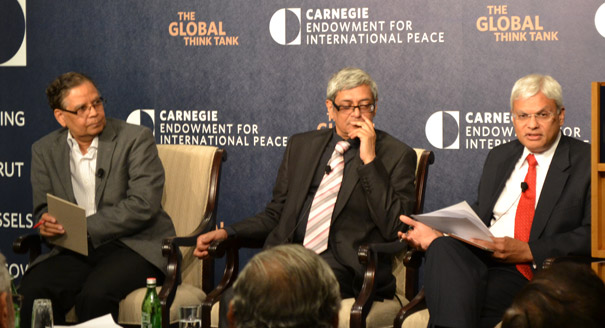Registration
You will receive an email confirming your registration.
India has fallen far and fast from the runaway growth rates it enjoyed in the first decade of the twenty-first century. The recent election results have demonstrated a nationwide desire to reverse this trend.
Edited by Bibek Debroy, Ashley J. Tellis, and Reece Trevor, Getting India Back on Track contains analyses and prescriptions from some of India’s most incisive analysts for how the country can return to the path of high, sustained growth and international success.
Follow @CarnegieSAsia on Twitter and join the conversation with #IndiaonTrack.
Agenda
2:30–2:35 p.m.
Welcome and Introduction
- Jessica T. Mathews, Carnegie Endowment for International Peace
2:35–3:35 p.m.
Panel 1: Success at Last? Pursuing Economic Reform
- Moderator: Ashley J. Tellis, Carnegie Endowment for International Peace
- Bibek Debroy, Center for Policy Research
- Arvind Panagariya, Columbia University
3:35–3:45 p.m.
Break
3:45–4:45 p.m.
Panel 2: Inside and Outside—The Unfinished Agenda
- Moderator: Marshall Bouton, Asia Society Policy Institute
- Ashley J. Tellis, Carnegie Endowment for International Peace
- Milan Vaishnav, Carnegie Endowment for International Peace
Copies of the book will be available for purchase. Read the introduction by Ashley J. Tellis here.
Marshall M. Bouton
Marshall M. Bouton is president emeritus of the Chicago Council on Global Affairs. Bouton is currently interim director of the Asia Society Policy Institute and a senior fellow at the Center for the Advanced Study of India at the University of Pennsylvania.
Bibek Debroy
Bibek Debroy is a professor at the Center for Policy Research, New Delhi. He has worked in academia, industry chambers, and for the government, including in leadership positions in the Legal Adjustments and Reforms for Globalizing the Economy project and the Commission on Legal Empowerment of the Poor. Debroy is the author of several books, papers, and articles.
Jessica T. Mathews
Jessica T. Mathews is president of the Carnegie Endowment for International Peace. Before her appointment in 1997, her career included posts in both the executive and legislative branches of government, in management and research in the nonprofit arena, and in journalism and science policy.
Arvind Panagariya
Arvind Panagariya is the Jagdish Bhagwati Professor of Indian Political Economy in the Department of International and Public Affairs and of Economics at Columbia University. He was previously a professor of economics and co-director of the Center for International and Public Affairs at the University of Maryland, College Park, and the chief economist of the Asian Development Bank.
Ashley J. Tellis
Ashley J. Tellis is a senior associate at the Carnegie Endowment for International Peace specializing in international security, defense, and Asian strategic issues.
Milan Vaishnav
Milan Vaishnav is an associate in the South Asia Program at the Carnegie Endowment for International Peace, where he coordinates Carnegie’s India Decides 2014 initiative.
